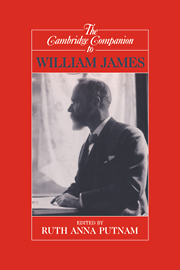Book contents
- Frontmatter
- Introduction
- 1 Pragmatism and introspective psychology
- 2 Consciousness as a pragmatist views it
- 3 John Dewey's naturalization of William James
- 4 James, Clifford, and the scientific conscience
- 5 Religious faith, intellectual responsibility, and romance
- 6 The breathtaking intimacy of the material world
- 7 James, aboutness, and his British critics
- 8 Logical principles and philosophical attitudes
- 9 James's theory of truth
- 10 The James/Royce dispute and the development of Jarnests "solution"
- 11 William James on religious experience
- 12 Interpreting the universe after a social analogy
- 13 Moral philosophy and the development of morality
- 14 Some of life's ideals
- 15 “A shelter of the mind”
- 16 The influence of William James on American culture
- 17 Pragmatism, politics, and the corridor
- 18 James and the Kantian tradition
- Bibliography
- Index
18 - James and the Kantian tradition
Published online by Cambridge University Press: 28 May 2006
- Frontmatter
- Introduction
- 1 Pragmatism and introspective psychology
- 2 Consciousness as a pragmatist views it
- 3 John Dewey's naturalization of William James
- 4 James, Clifford, and the scientific conscience
- 5 Religious faith, intellectual responsibility, and romance
- 6 The breathtaking intimacy of the material world
- 7 James, aboutness, and his British critics
- 8 Logical principles and philosophical attitudes
- 9 James's theory of truth
- 10 The James/Royce dispute and the development of Jarnests "solution"
- 11 William James on religious experience
- 12 Interpreting the universe after a social analogy
- 13 Moral philosophy and the development of morality
- 14 Some of life's ideals
- 15 “A shelter of the mind”
- 16 The influence of William James on American culture
- 17 Pragmatism, politics, and the corridor
- 18 James and the Kantian tradition
- Bibliography
- Index
Summary
One of the most interesting and problematic threads in the literature on James concerns the relationship between his philosophy and Kant's. It is difficult to imagine at first two philosophers farther apart than Kant and James. Kant was a lover of unity and systematicity, and exalted the absolute and necessary features of our experience; James had little patience with philosophical systems, thought there was much less unity to the world than often imagined, and denied there were any utterly indefeasible elements in our experience. These deep differences are undeniable. It is perhaps then no surprise when we find Richard Rorty arguing that James's pragmatism is part of what he thinks of as “the anti-Kantian revolution” (Rorty 1979, 7). Elsewhere he writes:
No other American writers have offered so radical a suggestion for making our future different from our past, as have James and Dewey. . . . Logical empiricism was one variety of standard, academic, neo-Kantian, epistemologicallycentered philosophy. The great pragmatists should . . . be taken as . . . breaking with the Kantian epistemological tradition altogether. (Rorty 1982, 160)
- Type
- Chapter
- Information
- The Cambridge Companion to William James , pp. 363 - 384Publisher: Cambridge University PressPrint publication year: 1997
- 24
- Cited by

